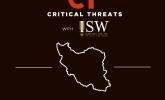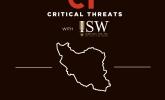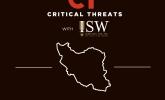Russian Offensive Campaign Assessment, November 8
November 8, 2022 - ISW Press
Iranian state-run outlet Nour News Agency reported that Russian National Security Council Secretary Nikolai Patrushev arrived in Tehran on November 8, likely to discuss the potential sale of Iranian ballistic missiles to Russia. Nour News Agency announced Patrushev’s arrival in an English-language tweet, stating that Iranian Supreme National Security Council (SNSC) Secretary Ali Shamkhani invited Patrushev and noted that Patrushev will also meet with other high-ranking Iranian political and economic officials to discuss Russo-Iranian cooperation. Nour News Agency is affiliated with the SNSC. The SNSC likely announced Patrushev’s arrival in Iran to highlight the deepening cooperation between Moscow and Tehran to an international audience (rather than domestically), as well as to implicitly highlight that a high-ranking Russian official turned to Iran for help in Ukraine. Islamic Revolutionary Guards Corps (IRGC) Quds Force Commander Qassem Soleimani notably traveled to Moscow in 2015 to appeal to Russia to intervene in the Syrian Civil War. Tehran is likely eager to publicly signal this rebalancing of its strategic partnership with Moscow, especially to regional Iranian adversaries with which the Kremlin occasionally cooperates, such as Israel and Saudi Arabia. Patrushev’s visit to Iran notably comes amid reports that the Iranian regime is seeking Russian help with protest suppression, although it is unclear if this will be discussed by Patrushev and his Iranian counterpart.








